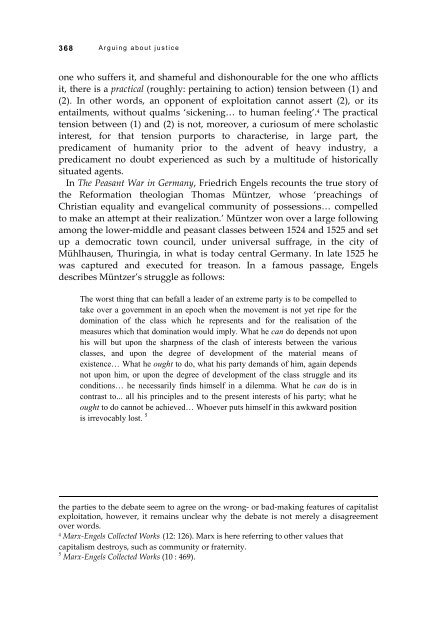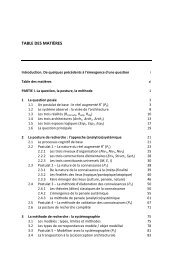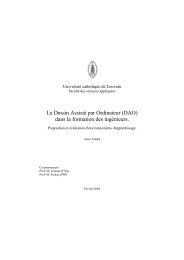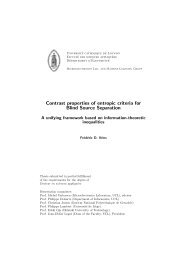- Page 5 and 6:
© Presses universitaires de Louvai
- Page 7 and 8:
6A r g u i n g a b o u t j u s t i
- Page 9 and 10:
8A r g u i n g a b o u t j u s t i
- Page 11 and 12:
10A r g u i n g a b o u t j u s t i
- Page 13 and 14:
12A r g u i n g a b o u t j u s t i
- Page 15 and 16:
14A r g u i n g a b o u t j u s t i
- Page 17 and 18:
16A r g u i n g a b o u t j u s t i
- Page 19 and 20:
18A r g u i n g a b o u t j u s t i
- Page 21 and 22:
20A r g u i n g a b o u t j u s t i
- Page 23 and 24:
22A r g u i n g a b o u t j u s t i
- Page 25 and 26:
24A r g u i n g a b o u t j u s t i
- Page 27 and 28:
26A r g u i n g a b o u t j u s t i
- Page 29 and 30:
28A r g u i n g a b o u t j u s t i
- Page 31 and 32:
30A r g u i n g a b o u t j u s t i
- Page 33 and 34:
32A r g u i n g a b o u t j u s t i
- Page 35 and 36:
34A r g u i n g a b o u t j u s t i
- Page 37 and 38:
36A r g u i n g a b o u t j u s t i
- Page 39 and 40:
38A r g u i n g a b o u t j u s t i
- Page 41 and 42:
40A r g u i n g a b o u t j u s t i
- Page 43 and 44:
42A r g u i n g a b o u t j u s t i
- Page 45 and 46:
44A r g u i n g a b o u t j u s t i
- Page 47 and 48:
46A r g u i n g a b o u t j u s t i
- Page 50 and 51:
Marriages as assets?Real freedom an
- Page 52 and 53:
A l s t o t t - M a r r i a g e s a
- Page 54 and 55:
A l s t o t t - M a r r i a g e s a
- Page 56 and 57:
A l s t o t t - M a r r i a g e s a
- Page 58 and 59:
A l s t o t t - M a r r i a g e s a
- Page 60 and 61:
A l s t o t t - M a r r i a g e s a
- Page 62 and 63:
The guaranteed income as an equalop
- Page 64 and 65:
A r n s p e r g e r & J o h n s o n
- Page 66 and 67:
A r n s p e r g e r & J o h n s o n
- Page 68 and 69:
A r n s p e r g e r & J o h n s o n
- Page 70:
A r n s p e r g e r & J o h n s o n
- Page 73 and 74:
72A r g u i n g a b o u t j u s t i
- Page 75 and 76:
74A r g u i n g a b o u t j u s t i
- Page 77 and 78:
76A r g u i n g a b o u t j u s t i
- Page 80 and 81:
Reflections on the limits of argume
- Page 82 and 83:
B a k e r - R e f l e c t i o n s o
- Page 84 and 85:
B a k e r - R e f l e c t i o n s o
- Page 86 and 87:
B a k e r - R e f l e c t i o n s o
- Page 88 and 89:
Taxation, fees and social justiceFr
- Page 90 and 91:
B l a i s - T a x a t i o n , f e e
- Page 92 and 93:
B l a i s - T a x a t i o n , f e e
- Page 94 and 95:
Real freedomfor all turtles in Suga
- Page 96 and 97:
B o u l a n g e r - R e a l f r e e
- Page 98 and 99:
B o u l a n g e r - R e a l f r e e
- Page 100 and 101:
B o u l a n g e r - R e a l f r e e
- Page 102 and 103:
B o u l a n g e r - R e a l f r e e
- Page 104 and 105:
B o u l a n g e r - R e a l f r e e
- Page 106 and 107:
Linguistic diversityand economic se
- Page 108 and 109:
B o w l e s - L i n g u i s t i c d
- Page 110 and 111:
B o w l e s - L i n g u i s t i c d
- Page 112 and 113:
B o w l e s - L i n g u i s t i c d
- Page 114 and 115:
B o w l e s - L i n g u i s t i c d
- Page 116 and 117:
Legitimate partiality, parents and
- Page 118 and 119:
B r i g h o u s e & S w i f t - L e
- Page 120 and 121:
B r i g h o u s e & S w i f t - L e
- Page 122 and 123:
B r i g h o u s e & S w i f t - L e
- Page 124:
B r i g h o u s e & S w i f t - L e
- Page 127 and 128:
126A r g u i n g a b o u t j u s t
- Page 129 and 130:
128A r g u i n g a b o u t j u s t
- Page 131 and 132:
130A r g u i n g a b o u t j u s t
- Page 133 and 134:
132A r g u i n g a b o u t j u s t
- Page 136 and 137:
Distributing freedom over whole liv
- Page 138 and 139:
C a r t e r - D i s t r i b u t i n
- Page 140 and 141:
C a r t e r - D i s t r i b u t i n
- Page 142 and 143:
C a r t e r - D i s t r i b u t i n
- Page 144:
C a r t e r - D i s t r i b u t i n
- Page 147 and 148:
146A r g u i n g a b o u t j u s t
- Page 149 and 150:
148A r g u i n g a b o u t j u s t
- Page 151 and 152:
150A r g u i n g a b o u t j u s t
- Page 153 and 154:
152A r g u i n g a b o u t j u s t
- Page 155 and 156:
154A r g u i n g a b o u t j u s t
- Page 158 and 159:
Why do we blame survivors?Jean-Mich
- Page 160 and 161:
C h a u m o n t - W h y d o w e b l
- Page 162 and 163:
C h a u m o n t - W h y d o w e b l
- Page 164 and 165:
C h a u m o n t - W h y d o w e b l
- Page 166:
C h a u m o n t - W h y d o w e b l
- Page 169 and 170:
168A r g u i n g a b o u t j u s t
- Page 171 and 172:
170A r g u i n g a b o u t j u s t
- Page 173 and 174:
172A r g u i n g a b o u t j u s t
- Page 175 and 176:
174A r g u i n g a b o u t j u s t
- Page 177 and 178:
176A r g u i n g a b o u t j u s t
- Page 179 and 180:
178A r g u i n g a b o u t j u s t
- Page 181 and 182:
180A r g u i n g a b o u t j u s t
- Page 183 and 184:
182A r g u i n g a b o u t j u s t
- Page 185 and 186:
184A r g u i n g a b o u t j u s t
- Page 187 and 188:
186A r g u i n g a b o u t j u s t
- Page 189 and 190:
188A r g u i n g a b o u t j u s t
- Page 191 and 192:
190A r g u i n g a b o u t j u s t
- Page 193 and 194:
192A r g u i n g a b o u t j u s t
- Page 195 and 196:
194A r g u i n g a b o u t j u s t
- Page 197 and 198:
196A r g u i n g a b o u t j u s t
- Page 199 and 200:
198A r g u i n g a b o u t j u s t
- Page 201 and 202:
200A r g u i n g a b o u t j u s t
- Page 203 and 204:
202A r g u i n g a b o u t j u s t
- Page 205 and 206:
204A r g u i n g a b o u t j u s t
- Page 207 and 208:
206A r g u i n g a b o u t j u s t
- Page 209 and 210:
208A r g u i n g a b o u t j u s t
- Page 211 and 212:
210A r g u i n g a b o u t j u s t
- Page 213 and 214:
212A r g u i n g a b o u t j u s t
- Page 215 and 216:
214A r g u i n g a b o u t j u s t
- Page 217 and 218:
216A r g u i n g a b o u t j u s t
- Page 219 and 220:
218A r g u i n g a b o u t j u s t
- Page 221 and 222:
220A r g u i n g a b o u t j u s t
- Page 223 and 224:
222A r g u i n g a b o u t j u s t
- Page 225 and 226:
224A r g u i n g a b o u t j u s t
- Page 227 and 228:
226A r g u i n g a b o u t j u s t
- Page 230 and 231:
English or Esperanto:a case for lev
- Page 232 and 233:
F l e u r b a e y - E n g l i s h o
- Page 234 and 235:
F l e u r b a e y - E n g l i s h o
- Page 236:
F l e u r b a e y - E n g l i s h o
- Page 239 and 240:
238A r g u i n g a b o u t j u s t
- Page 241 and 242:
240A r g u i n g a b o u t j u s t
- Page 243 and 244:
242A r g u i n g a b o u t j u s t
- Page 245 and 246:
244A r g u i n g a b o u t j u s t
- Page 247 and 248:
246A r g u i n g a b o u t j u s t
- Page 249 and 250:
248A r g u i n g a b o u t j u s t
- Page 251 and 252:
250A r g u i n g a b o u t j u s t
- Page 253 and 254:
252A r g u i n g a b o u t j u s t
- Page 255 and 256:
254A r g u i n g a b o u t j u s t
- Page 257 and 258:
256A r g u i n g a b o u t j u s t
- Page 259 and 260:
258A r g u i n g a b o u t j u s t
- Page 262 and 263:
Should a Marxistbelieve in human ri
- Page 264 and 265:
L a c r o i x - S h o u l d a M a r
- Page 266 and 267:
L a c r o i x - S h o u l d a M a r
- Page 268:
L a c r o i x - S h o u l d a M a r
- Page 271 and 272:
270A r g u i n g a b o u t j u s t
- Page 273 and 274:
272A r g u i n g a b o u t j u s t
- Page 275 and 276:
274A r g u i n g a b o u t j u s t
- Page 277 and 278:
276A r g u i n g a b o u t j u s t
- Page 279 and 280:
278A r g u i n g a b o u t j u s t
- Page 281 and 282:
280A r g u i n g a b o u t j u s t
- Page 284 and 285:
A universal duty to careIngrid Robe
- Page 286 and 287:
R o b e yn s - A u n i v e r s a l
- Page 288 and 289:
R o b e yn s - A u n i v e r s a l
- Page 290 and 291:
R o b e yn s - A u n i v e r s a l
- Page 292 and 293:
The ideological roots of inequality
- Page 294 and 295:
R o e m e r - T h e i d e o l o g i
- Page 296 and 297:
R o e m e r - T h e i d e o l o g i
- Page 298 and 299:
R o e m e r - T h e i d e o l o g i
- Page 300 and 301:
R o e m e r - T h e i d e o l o g i
- Page 302 and 303:
R o e m e r - T h e i d e o l o g i
- Page 304 and 305:
Philosophers andtaboo trade-offs in
- Page 306 and 307:
S c h o k k a e r t - P h i l o s o
- Page 308 and 309:
S c h o k k a e r t - P h i l o s o
- Page 310:
S c h o k k a e r t - P h i l o s o
- Page 313 and 314:
312A r g u i n g a b o u t j u s t
- Page 315 and 316:
314A r g u i n g a b o u t j u s t
- Page 317 and 318: 316A r g u i n g a b o u t j u s t
- Page 319 and 320: 318A r g u i n g a b o u t j u s t
- Page 322 and 323: On genetic inequalityHillel Steiner
- Page 324 and 325: S t e i n e r - O n g e n e t i c i
- Page 326 and 327: S t e i n e r - O n g e n e t i c i
- Page 328 and 329: A federal electoral district for Be
- Page 330 and 331: S t o j a n o v i c - A f e d e r a
- Page 332 and 333: S t o j a n o v i c - A f e d e r a
- Page 334 and 335: S t o j a n o v i c - A f e d e r a
- Page 336: S t o j a n o v i c - A f e d e r a
- Page 339 and 340: 338A r g u i n g a b o u t j u s t
- Page 341 and 342: 340A r g u i n g a b o u t j u s t
- Page 343 and 344: 342A r g u i n g a b o u t j u s t
- Page 345 and 346: 344A r g u i n g a b o u t j u s t
- Page 347 and 348: 346A r g u i n g a b o u t j u s t
- Page 349 and 350: 348A r g u i n g a b o u t j u s t
- Page 351 and 352: 350A r g u i n g a b o u t j u s t
- Page 353 and 354: 352A r g u i n g a b o u t j u s t
- Page 355 and 356: 354A r g u i n g a b o u t j u s t
- Page 357 and 358: 356A r g u i n g a b o u t j u s t
- Page 359 and 360: 358A r g u i n g a b o u t j u s t
- Page 361 and 362: 360A r g u i n g a b o u t j u s t
- Page 363 and 364: 362A r g u i n g a b o u t j u s t
- Page 365 and 366: 364A r g u i n g a b o u t j u s t
- Page 370 and 371: V r o u s a l i s - L a m e n t a t
- Page 372 and 373: V r o u s a l i s - L a m e n t a t
- Page 374 and 375: V r o u s a l i s - L a m e n t a t
- Page 376: V r o u s a l i s - L a m e n t a t
- Page 379 and 380: 378A r g u i n g a b o u t j u s t
- Page 381 and 382: 380A r g u i n g a b o u t j u s t
- Page 383 and 384: 382A r g u i n g a b o u t j u s t
- Page 385 and 386: 384A r g u i n g a b o u t j u s t
- Page 388 and 389: Why we demand anunconditional basic
- Page 390 and 391: W i d e r q u i s t - T h e E C S O
- Page 392 and 393: W i d e r q u i s t - T h e E C S O
- Page 394 and 395: W i d e r q u i s t - T h e E C S O
- Page 396 and 397: Linguistic protectionismand wealth
- Page 398 and 399: W i l l i a m s - L i n g u i s t i
- Page 400 and 401: W i l l i a m s - L i n g u i s t i
- Page 402 and 403: W i l l i a m s - L i n g u i s t i
- Page 404 and 405: In defense of genderlessnessErik Ol
- Page 406 and 407: W r i g h t - I n d e f e n s e o f
- Page 408 and 409: W r i g h t - I n d e f e n s e o f
- Page 410 and 411: W r i g h t - I n d e f e n s e o f
- Page 412 and 413: W r i g h t - I n d e f e n s e o f
- Page 414: W r i g h t - I n d e f e n s e o f
- Page 417 and 418:
416A r g u i n g a b o u t j u s t
- Page 419 and 420:
418A r g u i n g a b o u t j u s t
- Page 421 and 422:
420A r g u i n g a b o u t j u s t
- Page 423:
422A r g u i n g a b o u t j u s t







